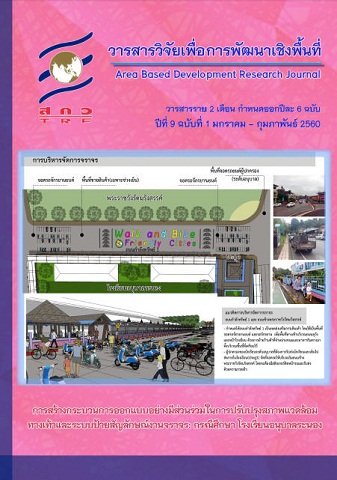การพัฒนาหลักสูตรฝึกอบรมภาษาอังกฤษ เพื่อการสื่อสารสำหรับการท่องเที่ยวโดยชุมชน จังหวัดชุมพร
Main Article Content
Abstract
งานวิจัยและพัฒนานี้ ใช้ระเบียบวิธีการวิจัยแบบผสมผสานของการวิจัยเชิงปริมาณและเชิงคุณภาพด้วยกันโดยมีวัตถุประสงค์เพื่อศึกษาข้อมูลพื้นฐานสําหรับการพัฒนาหลักสูตรฝึกอบรมภาษาอังกฤษเพื่อการสื่อสารสําหรับการท่องเที่ยวโดยชุมชน จังหวัดชุมพร และพัฒนาหลักสูตรฝึกอบรมที่เหมาะสมกับบริบทพื้นที่ รวมทั้งสร้างรูปแบบการเรียนรู้ภาษาอังกฤษเพื่อการสื่อสารสําหรับการท่องเที่ยวโดยชุมชน โดยดําเนินการวิจัยในพื้นที่แหล่งท่องเที่ยวจังหวัดชุมพร จํานวน 13 แหล่ง กลุ่มตัวอย่างแบ่งออกเป็น 2 กลุ่ม คือ กลุ่มตัวอย่างที่ใช้ในการสํารวจความต้องการในการพัฒนาความสามารถด้านภาษาอังกฤษเพื่อการสื่อสารสําหรับการท่องเที่ยว จํานวน 80 คน และกลุ่มตัวอย่างที่เข้ารับการฝึกอบรมเพื่อศึกษาผลการทดลองใช้หลักสูตรฝึกอบรม จํานวน 23 คน จากศูนย์การเรียนรู้ตามศาสตร์พระราชา โครงการพัฒนาพื้นที่หนองใหญ่ตามพระราชดําริ อําเภอเมือง และชุมชนเกาะพิทักษ์ อําเภอหลังสวน จังหวัดชุมพร กระบวนการวิจัยแบ่งออกเป็น 5 ขั้นตอน คือ 1) การศึกษาสํารวจข้อมูลพื้นฐานและความต้องการของกลุ่มตัวอย่างโดยใช้แบบสอบถาม 2) การพัฒนาหลักสูตรฝึกอบรม 3) การประเมินร่างหลักสูตรฝึกอบรมโดยผู้เชี่ยวชาญ 4) การทดลองใช้หลักสูตรฝึกอบรมกับกลุ่มตัวอย่าง ระยะเวลา 36 ชั่วโมง และ 5) ประเมินผลหลักสูตรฝึกอบรม ผลการศึกษาพบว่า หลักสูตรฝึกอบรมที่พัฒนาขึ้น มีประสิทธิภาพสามารถช่วยพัฒนาความรู้และความสามารถด้านภาษาอังกฤษให้แก่กลุ่มผู้เข้าร่วมฝึกอบรมได้ หลังการฝึกอบรมผู้เข้ารับการอบรมมีความรู้และความสามารถมากขึ้น โดยคะแนนหลังฝึกอบรมมีค่าสูงกว่าคะแนนก่อนฝึกอบรมอย่างมีนัยสําคัญทางสถิติ (p < 0.05) ทั้งนี้ผู้เข้าร่วมฝึกอบรมมีความพึงพอใจต่อหลักสูตรฝึกอบรม ในระดับมากที่สุด และรูปแบบการเรียนรู้ภาษาอังกฤษเพื่อการสื่อสารสําหรับการท่องเที่ยวโดยชุมชน ประกอบด้วย 3 ส่วน คือ 1) ข้อมูลพื้นฐานของแต่ละบุคคล ความต้องการ ความพร้อมและเป้าหมายในการเรียนรู้ 2) กระบวนการเรียนรู้ผ่านการฝึกอบรม คิดเป็นร้อยละ 10 ของกระบวนการเรียนรู้ และการเรียนรู้ด้วยตนเอง คิดเป็นร้อยละ 90 ของกระบวนการเรียนรู้ และ 3) ผลลัพธ์ของการเรียนรู้ (ความสําเร็จ)
Curriculum Development in English Communication Course for Community-Based Tourism in Chumphon Province
This research and development integrated the quantitative with qualitative research. The purposes were to study the basic requirements for developing the training curriculum of English communication course for community-based tourism in Chumphon province and to develop the training curriculumas well as to initiate an English communication learning model for community-based tourism. This study was conducted in 13 community-based tourism sites with 2 sample groups which were as the following: 80 people were selected for need assessment and 23 people from the Sufficiency Economy Learning Center of His Majesty the King, Muang district and Phitak Island, Langsuan district, Chumphon province were selected to participate and evaluate the training curriculum. The 5 steps were 1) studying the basic requirements and need assessment for developing the training curriculum, 2) developing the training curriculum, 3) evaluating the training curriculum, 4) implementing the training curriculum with the sample groups for 36 hours and 5) evaluating the training curriculum in order to find out curriculum efficiency. The study revealed that after the experiment, the participants had enriched their knowledge and increased their understanding ability about English communication for community-based tourism at a significant level, which was below 0.05. However, the participants were very satisfied with the training course. The English communication learning model for community-based tourism consists of 3 parts which are: 1) basic information of a person as well as need, readiness and goal, 2) learning process divided into 2 parts: learning trough the training course (10 percent) and self-study (90 percent), and 3) learning output (achievement).
Article Details
Area Based Development Research Journal values copyright protection and licensing to safeguard author rights and facilitate the appropriate dissemination of research. Our policies ensure openness, accessibility, and attribution. Authors retain copyright ownership, and articles are published under a Creative Commons Attribution License (CC BY), allowing sharing, adaptation, and proper attribution. Authors have the freedom to publish under the CC BY license, granting broad reuse and distribution permissions. The journal supports posting articles on third-party repositories, adhering to institutional and funding restrictions. Author guidelines detail copyright and licensing requirements, empowering authors with knowledge about their rights and responsibilities. These policies cultivate an environment of collaboration, openness, and responsible sharing, benefiting authors and the research community while honoring intellectual property rights.


